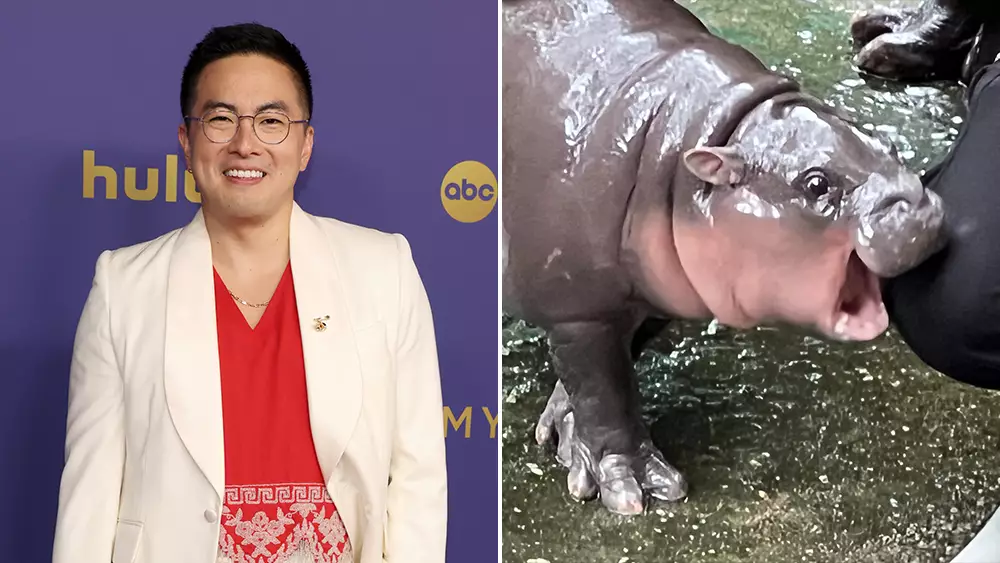The latest installment of *Saturday Night Live* (SNL) highlighted not only comedic talent but also the increasing need for boundaries between public figures and their audiences. The premiere of Season 50 featured an unforgettable sketch revolving around Moo Deng, a viral pygmy hippopotamus, gracefully depicted by comedian Bowen Yang. By using the whimsical and humorous character of Moo Deng, the show not only entertained but also created a platform for critical commentary on personal space, exploitation, and the blurred lines of parasocial relationships.
Yang’s performance as Moo Deng expressed a profound awareness of what it can feel like to be reduced to entertainment—a sensation amplified by his character’s lamentation of being persistently harassed by fans. He delivered biting commentary dressed in a purple, bulbous animal suit, cleverly facilitating a discourse about the personal toll that comes with viral fame. This character was used as a microcosm for a larger societal critique: the struggle for autonomy and humanity amidst the demands of public life. Yang declared, “Reminder: Women owe you nothing!” This remark transcends the immediate comedic context, broaching the critical discussions about gender expectations and entitlement that resonate well beyond the walls of the SNL studio.
Humor Meets Serious Issues
The comedic approach taken by Yang showcased his ability to meld humor with serious themes effectively. Moo Deng’s assertion that he will not engage with his audience during his “work” time underscores the need for respect and personal boundaries that are often neglected in the realm of celebrity culture. As Yang emphasized his slippery body that “bounces,” he also touched on a more serious note regarding the representation of marginalized characters in media. He pointed out that prior to his portrayal, hippo representation was minimal, limited to children’s games and animated films. This undoubtedly adds another layer of humor to the sketch, while also engaging critical thought about the ways various entities, including animals, are represented and commodified in popular culture.
In another layer of the sketch, Yang drew parallels between Moo Deng’s experience and the harassment faced by performers like Chappell Roan. This connection brought the sketch to life by intertwining it with the broader narrative of how artists endure undue scrutiny and mistreatment in their careers. By embodying this hippo character, Yang was not only contributing laughter but also advocating for the rights and dignity of public figures.
Social Commentary Wrapped in Satire
The sketch did not limit itself only to personal boundaries but also strayed into the territory of political satire, showcasing the versatility of *Weekend Update*. Guest Devon Walker, channeling New York City’s most recent mayor, Eric Adams, added further whimsy and provocation to the night. The SNL team leverages political figures’ follies to create an accessible space for critique, reminding viewers that leaders are also susceptible to public scrutiny. Walker’s portrayal resonated with public sentiments about the inefficacies of leadership, cleverly mixing real scandals with ludicrous exaggerations. For example, the juxtaposition of Adams’ “war on rats” with a humorous reflection on how the rats are “winning” serves as a mirror to the struggles faced within city governance.
Moreover, the reference to luxury travel and political favors adds another layer of complexity, commenting on the relationships between politics and ethics. This humor underscores the disillusionment that many experience toward their elected officials, providing a relatable frustration that bonds the audience in laughter.
In essence, the SNL premiere’s combination of absurd humor and poignant commentary invites viewers to reflect on not just the entertainment value but the underlying message about personal boundaries, species representation, and societal criticism. By embodying the character of Moo Deng, Bowen Yang navigates the intricate waters of public interaction while reinforcing the importance of maintaining one’s identity amidst an increasingly demanding public life.
As audiences resonate with the themes presented, this sketch serves as a reminder: the intersection of art and societal critique can lead to meaningful conversations, all while keeping a smile on our faces. Thus, through humor, *Saturday Night Live* continues its legacy of pushing boundaries, whether they exist between personal and public life or art and reality.
